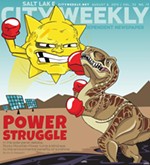D.I.Why?
If you’re reading this paper, you probably feel a fundamental sympathy for the idea that “local and independent” means something in an era of corporate homogeneity. You may be sitting in your favorite non-Starbucks coffee joint even now, or listening to what remains of community radio, lamenting somewhere in the back of your mind the disappearance of a favorite independent retailer. You are our people, and we salute you.
You are also, in all likelihood, the people to whom Michel Gondry is pitching Be Kind Rewind. While his loopy comedy begins from a high-concept premise, it’s fundamentally a celebration of everything that maintains a degree of distinct local flavor and has not been focus-group-tested to near-death. But somewhere along the way, Gondry’s paean to the low-budget D.I.Y. spirit conflates its own appeal with that of its protagonists. And the meandering shenanigans of two nobodies from nowhere aren’t quite as appealing coming from two famous personalities working in a Time Warner-released movie.
The two nobodies in question are Mike (Mos Def) and Jerry (Jack Black); the nowhere is a low-rent district of Passaic, New Jersey. Mike works at the Be Kind Rewind video store owned by Mr. Fletcher (Danny Glover), where the business plan has them renting only VHS tapes in a DVD world. Marked for demolition as part of a neighborhood renewal plan, the store stumbles upon an odd way to stand out from the competition after Jerry’s exposure to high voltage causes him to de-magnetize and erase every tape in the store. With their home-video camera, Mike and Jerry begin re-recording all the missing movies, creating quickie versions of Ghostbusters, Rush Hour 2, Driving Miss Daisy and more for an increasingly fascinated local clientele.
At first blush, the notion is faintly insulting—not that we should believe a magnetically-charged human could wreak such havoc, but that the store’s working-class patrons would embrace Mike and Jerry’s dopey doppelgangers of Hollywood hits. But Gondry gradually builds the boys’ project into a kind of grass-roots empowerment. Faced with the prospect that external political decisions could change their community forever, the residents rally around the notion that two ordinary guys could turn themselves into celebrities. It’s the philosophical “I’m on a TV, therefore I exist” proposition that drives reality programs: Video, ergo someone.
And it’s hard not to get sucked in to the oddball charm of the micro-budget knockoffs. Mike and Jerry wrap themselves in foil and improvise special-effects shots for their Ghostbusters; they recruit a worker at a nearby Laundromat (Melonie Diaz) to play the necessary ingénue roles. There’s even a mini-cautionary tale as the growing demand for additional titles turns their little production outfit into exactly the kind of churn-’em-out machine they’re reacting against.
Gondry, however, seems to think that the affection shown to Mike and Jerry’s ragged efforts should carry over to his own ragged effort. As was the case in his The Science of Sleep, Gondry lets his ideas sort of drop and drip where they will, and doesn’t seem particularly concerned with focusing his actors’ performances. Mos Def—perhaps convinced that playing opposite Jack Black means disappearing into the background—becomes too passive by far, while Black dials up his wild-eyebrowed clown act to a dog-whistle pitch. And the in-joke of dropping Sigourney Weaver into the movie for a cameo as a movie-industry lawyer—get it, she was in Ghostbusters, too!—feels like exactly the kind of blockbuster crutch the story is mocking.
It all builds to Mike and Jerry’s epic project, as they move away from remakes to create their own biopic of local legend Fats Waller. But the entertainment value of watching people work with cardboard props and limited talent begins to fade once they’re working with “original” material. There’s an undeniable thematic appeal to the idea of ordinary folk joining forces to create something with a distinctive voice, something left rough, unpolished and utterly, idiosyncratically itself. But you’ve still got to watch Be Kind Rewind to absorb that message, and its rough, unpolished qualities aren’t quite so charming. Celebrating the independent spirit doesn’t mean a desire for quality suddenly disappears; we’ve seen enough Sundance-pedigree duds to understand that. Michel Gondry invites us to rewind to a time before corporate domination, while failing to realize that “corporate” and “professional” are not necessarily synonyms.
BE KIND REWIND
**1/2 (two and a half out of four stars)
Starring: Jack Black, Mos Def, Melonie Diaz.
Written and directed by Michel Gondry.
Rated PG-13.



